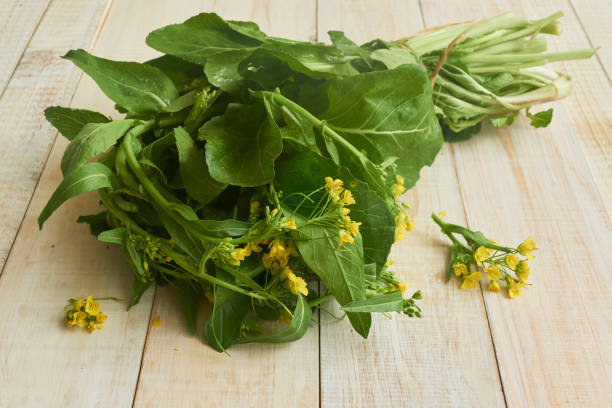Mustard greens are very low in sodium. Diets low in sodium may reduce the risk of high blood pressure. Mustard greens are very low in sodium. Mustard greens, as part of a low sodium diet, may reduce the risk of high blood pressure.
Does Eating Mustard Help Lower High Blood Pressure?

Blood Pressure Nutrients
Ground mustard seed, mustard greens and mustard oil have no more than 14 milligrams of sodium per serving. A reduced-sodium diet can lower your blood pressure, and individuals with high blood pressure should have no more than 1,500 milligrams per day, according to the 2010 Dietary Guidelines from the U.S. Department of Health and Human Services. Dietary fiber, calcium and vitamin C may lower your blood pressure, according to the Linus Pauling Institute Micronutrient Information Center, and mustard greens provide each of these nutrients.
Healthy Fats and Weight Control
Each tablespoon of mustard oil has nearly 9 grams of monounsaturated fats, and this kind of fat may lower your blood pressure as well as your cholesterol levels, according to the American Heart Association. Mustard oil and mustard seed supply omega-3 fats, which may lower your risk for heart disease, according to the Linus Pauling Institute Micronutrient Information Center. Obesity increases your risk for hypertension, and mustard greens can help you control your calorie intake and lower high blood pressure because each cup has only 15 calories. Mustard oil provides 124 calories per tablespoon, so eat it only in moderation to avoid unwanted weight gain.
Role in DASH Diet
Mustard can be part of the Dietary Approaches to Stop Hypertension, or DASH, diet, which is an eating pattern to lower high blood pressure, according to the 2010 Dietary Guidelines from the U.S. Department of Health and Human Services. A 2,000-calorie DASH diet includes four to five daily servings of vegetables, such as mustard greens, and two to three servings of healthy fats, such as mustard oil. To limit your sodium intake, the DASH diet recommends flavoring your food with spices, such as mustard seed, instead of salt.
Precautions
Not all forms of mustard are healthy for your blood pressure. Prepared deli mustard can be high in sodium, and honey mustard dips and sauces can be high in sodium, sugars and calories. Prepared mustard made with vinegar is a high-acid food, so be cautious if you have heartburn. On their own, dietary modifications are not always effective in reducing high blood pressure to a healthy range, and your doctor may recommend other lifestyle changes, such as exercise or stress reduction, or prescription medications.
Other Benefits of Mustard
Mustard is known for its rubefacient properties which can help in relieving any kind of muscle spasm. Consuming a tsp of yellow mustard powder can help in maintaining strong bones, joints and muscles as it is a good source of potassium and calcium.






